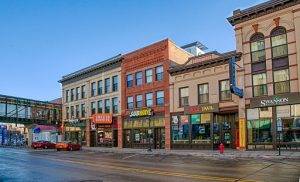The term commercial real estate refers to real estate for investment purposes. The term is often used to describe investment properties of all types. Some examples include income-producing properties, mixed-use properties, and non-residential properties. Regardless of the type of property, the basic elements of a commercial investment are cash inflows and outflows, timing of the cash flows, and risk. Commercial real estate investment professionals provide services to investors, such as providing an analysis of these basic elements.
Mixed-use properties

Mix-use properties are buildings that include residential units as well as commercial space. A typical example of a mixed-use building is a downtown center in a small town in New Jersey. Its mix of commercial and residential units is designed to accommodate the needs of different types of tenants. A mixed-use building may contain a restaurant, coffee shop, or hotel. A commercial space may also have a restaurant or movie theater. Mixed-use properties often promote a sense of community and can attract businesses such as dentist offices, hair salons, and clothing and shoe stores.
The combination of residential and commercial property can help the city’s economy, while also improving walkability. Mixed-use developments can also create a sense of community in a city by attracting the right kind of renters. As a result, they are desirable for both real estate investors and residents. They are the ideal combination for many businesses, including retailers and restaurants. This unique blend of uses can provide an area with a diverse population and increase property values.
Mix-use properties can be difficult to finance, but with proper pitching, a mixed-use development may be a viable investment. Lenders may be wary of lending money to mixed-use properties, but if done right, the benefits will make up for any short-term setbacks. And since they require multiple people to run a mixed-use development, this type of loan is difficult to obtain, especially in rural areas.
Income-producing properties

There are many benefits to owning income-producing properties in commercial real estate. Rental properties tend to be low-maintenance and affordable, while the rental demand is high, making them a good choice for long-term investment. For maximum rental income, you should choose a location near a popular tourist attraction. Investing near a university or college campus is also highly advantageous. You can also use the Airbnb platform to rent out your property to travelers.
There are several different types of commercial properties, including office buildings, retail spaces, industrial buildings, and multi-family residential complexes. These types of properties are built to generate income for the owners and often offer monthly rental income that is divided among investors. While this can be a great way to generate income while reducing your investment risk, you should only consider income-producing properties in commercial real estate if they are highly sought after by renters. You should avoid properties that are expensive to maintain or have major upgrades that cut into your cash flow.
The best way to make the most out of income-producing properties is to learn as much as possible about the industry. Before investing in any property, it is vital to do a thorough market analysis. Prepare a high-end capitalization rate, and decide what kind of income-producing property you are interested in. Next, find a property with a pre-approved loan and begin the negotiation process. Once you find a suitable property, make an inspection of it.
Non-residential properties
In a nutshell, non-residential properties are properties that are not used for residential purposes. This type of property can be any non-residential property. It is also possible to find a non-residential property that has a number of units greater than one. Commercial real estate encompasses a wide variety of activities, from buying and selling to development and construction. The top ten New York City real estate owners own a total of 546 million square feet of property and operate with a combined value of $8.1 billion.
While some non-residential properties are considered commercial property, others are not. Bungalows, factories, hospitals, prisons, and vacant plots of land are all examples of non-residential properties. Bed and breakfast properties are also typically non-residential properties, but newer forms of temporary accommodations may be excluded from the non-residential LBTT rate. But regardless of its classification, there are some important factors to keep in mind when investing in non-residential properties.
Tax benefits. When a property is commercial, it is taxed differently than a residential property. A residential property is defined as a dwelling by legislation. A non-residential property is not considered a dwelling by law, but is developed for residential purposes. Some tax benefits apply to commercial property, while others may not. The distinction between residential and non-residential property is ambiguous.

